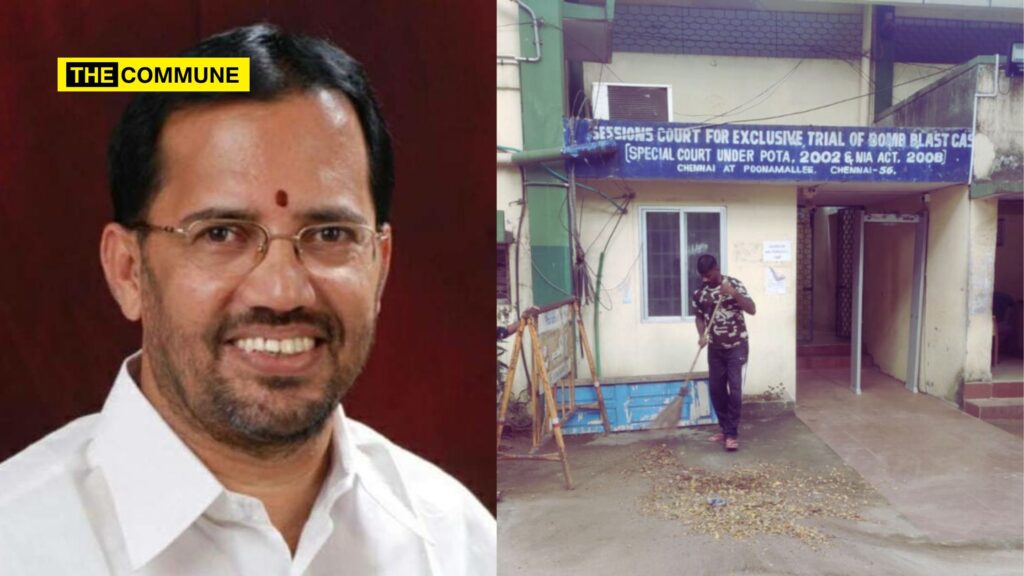The special court in Poonamallee has picked pace in the long-pending Auditor Ramesh murder case involving Islamic terrorists. The case, which had been stalled for some time, has now regained momentum. The special public prosecutor has been questioning key witnesses, including Auditor Ramesh’s brother, Seshadri, in court. Meanwhile, reports indicate that accused policeman Fakhruddin and his associates are refusing to cooperate with the investigation.
இஸ்லாமிய பயங்கரவாதிகளால் ஆடிட்டர்
ரமேஷ் கொலை செய்யப்பட்ட வழக்கு!பூந்தமல்லி நீதிமன்றத்தில்
ஆடிட்டர் ரமேஷின் சகோதரர் சேஷாத்ரி
உள்ளிட்ட சாட்சிகளிடம்
சிறப்பு அரசு வழக்கறிஞர் விசாரணைநீண்ட காலமாக இழுத்தடிக்கப்பட்டு வந்த
வழக்கு தற்போது மீண்டும் வேகமெடுத்துள்ளதுகுற்றம்சாட்டப்பட்ட… pic.twitter.com/byxzHaWPjB
— Tamil Janam (@TamilJanamNews) December 11, 2024
Who Is Auditor Ramesh?
He was a prominent figure in the Tamil Nadu BJP and a staunch advocate of Hindutva, Auditor Ramesh had served twice as the party’s state general secretary. At the age of 54, Ramesh was brutally murdered on the night of 19 July 2013, outside his residence in the Maravaneri area of Salem, shortly after returning from a meeting with party members. Assailants, who had been waiting near his home, attacked him with sharp weapons, inflicting fatal injuries to his head and neck.
Who Were The Suspects?
The investigation led to the arrest of Bilal Malik and ‘Police’ Fakhruddin in October 2013. Both were also implicated in the 2011 Madurai pipe bomb case and other attacks targeting right-wing Hindu leaders. Fakhruddin was apprehended by the Crime Branch CID, while Malik and another suspect were captured in Puttur, Andhra Pradesh, following a nearly 12-hour standoff. The Tamil Nadu Police’s Special Investigation Division (SID) took charge of the case.
Aftermath Of Murder
The murder sparked widespread outrage among BJP members and Hindutva groups across Tamil Nadu. Protests erupted, with demonstrators blaming police negligence and state intelligence failures, particularly as Ramesh had reportedly received death threats and his car had been torched before his murder. The tragedy led to further repercussions: BJP state executive member B. Rajeshwari, 42, reportedly self-immolated in protest, while the death of district executive member K. Murugamani from cardiac arrest was also linked to the heightened tensions following Ramesh’s killing.
The case gained national attention, with the BJP pushing for a thorough investigation and using it to underscore what they described as a hostile environment for their workers in Tamil Nadu. At the time, several attacks on Hindutva leaders had occurred, including the 1994 killing of Rajagopalan, the state president of the Hindu Munnani, an RSS-affiliated organization. BJP leaders, including then-state president Pon Radhakrishnan, accused the J. Jayalalithaa-led government of indifference to such violence.
Narendra Modi, Gujarat’s Chief Minister at the time and a rising national figure, called Ramesh’s family to offer condolences. Later that year, during a rally in Tiruchi, Modi criticized the slow progress in the investigation, sharing the stage with then-Chief Minister Jayalalithaa.
Current Case Status
The trial has faced repeated delays and adjournments over the years. In February 2023, the Madras High Court directed the special court to expedite proceedings, citing the prolonged nature of the case. The accused remain in custody, facing charges in multiple cases involving organized crime and radical Islamist activities.
Subscribe to our channels on Telegram, WhatsApp, and Instagram and get the best stories of the day delivered to you personally.

